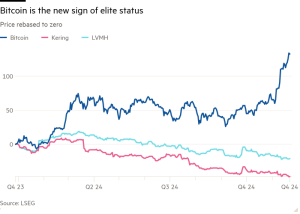Bank of England chief economist criticises statistics agency over poor jobs data
Unlock the Editor’s Digest for free
Roula Khalaf, Editor of the FT, selects her favourite stories in this weekly newsletter.
The chief economist of the Bank of England criticised the UK’s statistics agency in a private letter in May for failing since last year to produce reliable figures on unemployment and other aspects of the labour market.
Huw Pill told the Office for National Statistics its efforts to fix the UK’s labour market data “have not yet led to an improvement” and that it “remains uncertain whether the credibility” of the figures will improve.
The letter, released in response to a Freedom of Information request by the Financial Times, underlined the frustration at the central bank over the ONS’s failure to deliver usable information from its labour force survey (LFS) — a crucial input to the central bank’s decisions on interest rates.
“The LFS is still missing millions of workers from its estimate of the level of employment since the pandemic,” Pill told the ONS’s deputy national statistician Mike Keoghan.
He said the agency’s efforts to fix the survey, which had been hobbled by low response rates, had been insufficient to date.
“In our view they have not yet led to an improvement and it remains uncertain whether the credibility of labour force statistics will improve,” Pill wrote, adding that “response rates remain extraordinarily low”.
The ONS was forced to scrap publication of the LFS in October 2023 after a long-term decline in response rates left them so low that they were no longer reliable.
Although surveys, tax records and online job adverts give the BoE alternative indicators of trends in hiring, the LFS is the only source for estimates of unemployment and, crucially, of economic inactivity — the term for people who are neither working nor looking for a job.
The latest figures show the LFS had a total response rate of 18.5 per cent in the second quarter of 2024, up from 12.5 per cent in the third quarter of 2023 but well below the 55 per cent at which the LFS was designed to operate.
The agency has taken steps to boost engagement, including reintroducing face-to-face interviews and offering respondents cash incentives, and said in April that its “recovery plan” had led to a larger set of responses.
But it warned that “though we have seen some improvement, response rates and achieved sample do remain low by historical standards for the time being”.
Pill demanded officials take steps to improve data quality, in a sign of the BoE’s frustration with the lack of available data. After holding interest rates at 5.25 per cent in May, the central bank publicly called attention to “considerable uncertainty” over the jobs data that was making it “more difficult to gauge the underlying state of the labour market”.
“Relative to other sources of data on the labour market, including other ONS data such as the Workforce Jobs Survey, the LFS is still missing millions of workers from its estimate of the level of employment since the pandemic,” Pill told Keoghan.
“Quantitatively, that may make the difference between labour force participation having declined substantially since 2019 or having already recovered its pre-pandemic level,” he added.
Alongside its efforts to repair the LFS, the statistics agency is developing an online-first “transformed” labour force survey (TLFS), which is aimed at producing higher sample sizes.
Pill said the TLFS might eventually work as a replacement for the LFS, but warned that policymakers were “concerned that the lack of a credible baseline against which to measure TLFS outputs undermines that transition”.
Such problems could delay the shift to the TLFS by between 12 and 18 months more, Pill said, adding that there were “a number of key steps we believe the ONS must implement to address these challenges”.
They included aligning the LFS with the latest population estimates, restarting the publication of “flows” data — which has since occurred — and undertaking “wider work on the credibility of LFS estimates”.
“There are a range of important questions that the LFS would normally help us to understand, but currently cannot,” he wrote.
The ONS said in a statement: “In line with other statistics agencies around the world, we are responding to the challenge of falling response rates for household surveys.
“We have addressed and made good progress on the issues raised by the Bank of England, who we engage with very regularly about our work to improve our labour market statistics.”
The BoE declined to comment.
#Bank #England #chief #economist #criticises #statistics #agency #poor #jobs #data





